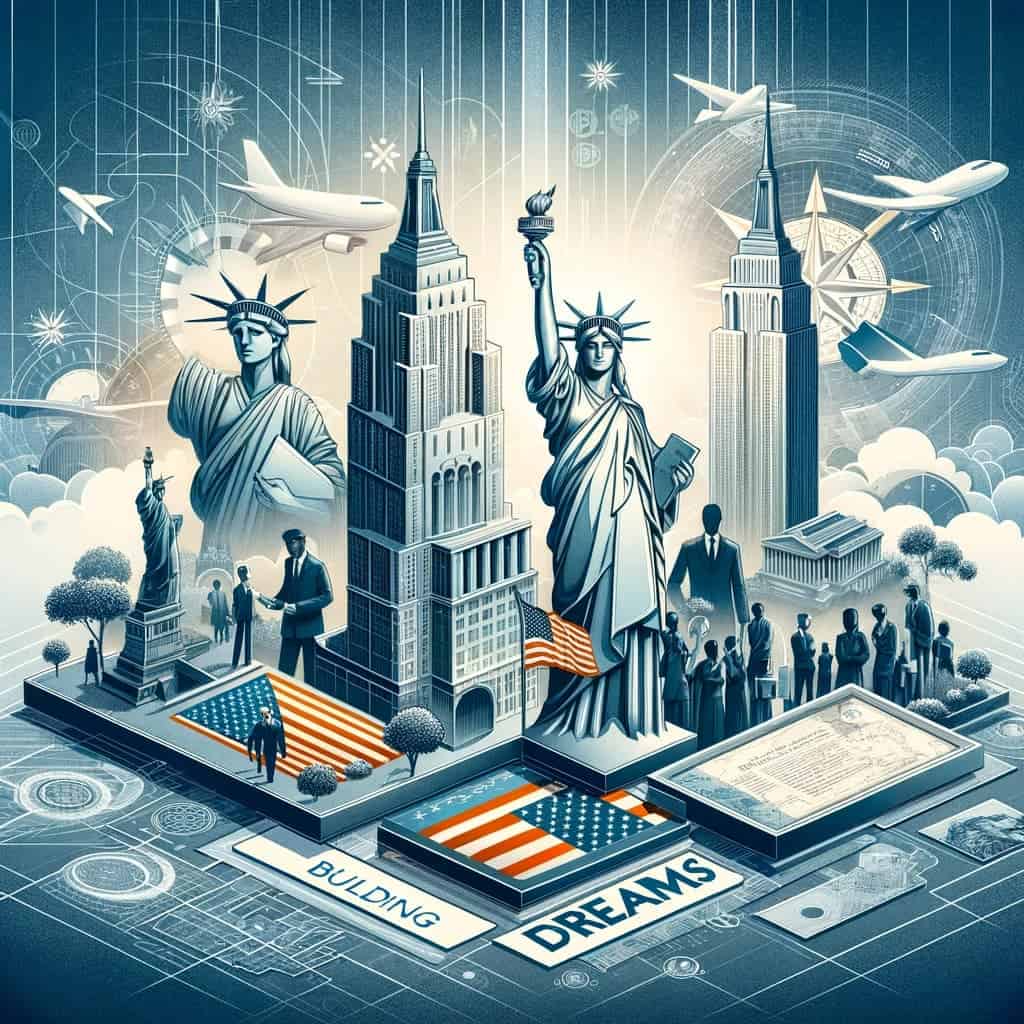
The United States offers a myriad of pathways for skilled professionals and academics seeking to contribute to its diverse and dynamic workforce. Among these are the EB-2 NIW (National Interest Waiver) and the EB-2 Visa categories, each presenting unique opportunities and challenges for aspiring immigrants.
While the EB-2 Visa is typically pursued by individuals with advanced degrees or exceptional ability in their field, the EB-2 NIW allows certain professionals to bypass the labor certification process, provided they demonstrate their work is in the national interest of the U.S.
This article aims to provide a comprehensive comparison between these two prominent visa categories. We’ll delve into their specific requirements, benefits, and limitations, helping you understand which pathway aligns best with your professional objectives and personal circumstances. Other guides go in more detailed about each type. For more information check for example these ones done by Global Citizen Solutions, an investment immigration firm:
Whether you’re an aspiring entrepreneur, a researcher, or a seasoned professional, understanding the nuances of these visa categories can be a critical step in your journey towards working and living in the United States.
Analyzing EB-2 NIW – Benefits and Challenges
Benefits of the EB-2 NIW
The EB-2 NIW (National Interest Waiver) visa is an attractive option for foreign nationals in many professionals due to several distinct advantages:
- No Employer Sponsorship Required: Unlike other employment-based visas, the EB-2 NIW does not require a job offer or employer sponsorship. This autonomy allows professionals to pursue their career goals in the U.S. more freely.
- National Interest Waiver: Applicants can bypass the labor certification process (PERM) if they can demonstrate that their work benefits the U.S. on a national scale. This could include contributions to healthcare, technology, or environmental conservation, among others.
- Flexibility in Career Moves: Holders of an EB-2 NIW visa have the flexibility to change jobs or employers without going through the hassle of reapplying for a new visa, as long as their new position aligns with the original national interest claim.
Challenges of the EB-2 NIW
However, securing an EB-2 NIW visa is not without its challenges:
- Stringent Eligibility Criteria: Applicants must meet a high standard of proof to demonstrate that their work is of national importance. This often requires extensive documentation, including letters of recommendation, publications, and evidence of significant contributions to their field.
- Uncertain Processing Times: The application process can be lengthy and unpredictable. Delays are common, and the timeline can be a significant consideration for those needing to make timely career or relocation decisions.
- Legal and Documentation Complexity: Preparing a successful EB-2 NIW application involves navigating complex legal requirements and compiling a comprehensive dossier of evidence. Many applicants seek professional legal assistance, adding to the cost and complexity of the process.
The EB-2 NIW visa presents a unique opportunity for individuals whose work can significantly benefit the U.S. Understanding these benefits and challenges is crucial for anyone considering this immigration pathway.
Exploring EB-2 Visa – Features and Limitations
Features of the EB-2 Visa
The EB-2 Visa is designed for professionals who possess advanced degrees or exceptional abilities in their fields. Here are its key features:
- Categories of Eligibility: The EB-2 Visa encompasses two primary categories: those with advanced degrees (typically a master’s or higher) and those with exceptional ability in the sciences, arts, or business.
- Employer Sponsorship: Unlike the EB-2 NIW, the EB-2 Visa requires a job offer and sponsorship from a U.S. employer. This sponsorship is a crucial part of the visa application process.
- Labor Certification Requirement: Applicants need to undergo the PERM labor certification process, which involves proving that there are no qualified U.S. workers available for the position offered to the foreign national.
- Potential for Adjustment of Status: EB-2 Visa holders can potentially adjust their status to become lawful permanent residents (green card holders), provided they meet all the necessary criteria.
Limitations of the EB-2 Visa
However, the EB-2 Visa also has its limitations:
- Dependence on Employer Sponsorship: The need for a job offer and employer sponsorship can limit the applicant’s flexibility and autonomy. Changes in employment may necessitate a new visa application process.
- Strict PERM Process: The labor certification process is rigorous and time-consuming, requiring employers to undertake recruitment efforts to demonstrate a lack of available U.S. workers.
- Backlog and Wait Times: Depending on the applicant’s country of origin, there can be significant backlogs and wait times for visa availability, particularly for highly populous countries.
- Rigorous Application Process: The application process for the EB-2 Visa is thorough, requiring extensive documentation, including academic records, employment history, and evidence of exceptional ability.
The EB-2 Visa is a pathway to the U.S. for highly skilled professionals, but navigating its requirements demands careful consideration and planning.
Comparative Analysis: Which Visa Suits You Best?
When choosing between the EB-2 NIW and the EB-2 Visa, several key factors should be considered:
- Employer Dependency: The EB-2 Visa requires employer sponsorship, making it suitable for those with a guaranteed job offer in the U.S. In contrast, the EB-2 NIW offers greater independence, ideal for entrepreneurs or researchers who may not have a fixed employer.
- Application Complexity: The EB-2 NIW demands a strong case proving national interest, which can be challenging to establish. The EB-2, while also complex, follows a more structured process with clear guidelines.
- Flexibility and Mobility: The EB-2 NIW provides more flexibility in terms of job mobility within the U.S., as it is not tied to a specific employer. The EB-2 is more restrictive, as changing jobs often requires going through part of the visa process again.
- Processing Times and Backlogs: Both visas face processing delays, but the EB-2 category can have longer wait times due to annual caps and country-specific backlogs.
Ultimately, the choice between the EB-2 NIW and the EB-2 Visa depends on individual circumstances, career goals, and the ability to meet the respective visa requirements.
Personal Journeys with EB-2 NIW and EB-2 Visas
EB-2 NIW: Dr. Ana’s Story of Research and Innovation
Dr. Ana Rodriguez, a biomedical researcher from Spain, embarked on her U.S. journey through the EB-2 NIW pathway. Despite facing initial challenges with the complex application process, her groundbreaking research in infectious diseases was recognized as being of both merit and national importance. Dr. Rodriguez’s story is a testament to how the EB-2 NIW visa can empower professionals to contribute significantly to U.S. scientific advancements without being tied to a specific employer. Her work not only advanced her career but also led to vital developments in public health, showcasing the real-world impact of the EB-2 NIW visa.
EB-2 Visa: Engineer Michael’s Path to Success
Michael Chen, a software engineer from China, utilized the EB-2 Visa route, backed by his advanced degree and a compelling job offer from a leading tech company in Silicon Valley. The EB-2 Visa’s requirement for employer sponsorship was a perfect fit for Michael, who was seeking stability and long-term career growth in the U.S. His journey highlights the EB-2 Visa’s role in attracting top-tier talent to American industries and the personal and professional growth opportunities it offers to skilled immigrants.
FAQs: Resolving Doubts on EB-2 NIW and EB-2 Visas (50 words)
Can I switch from an EB-2 NIW to an EB-2 Visa later?
Yes, it’s possible to switch, but it involves a new application process, including employer sponsorship for the EB-2 Visa.
Do I need a lawyer for the EB-2 NIW application?
While not mandatory, legal assistance is highly recommended due to the complexity of the application.
How long does it take to process an EB-2 Visa?
Processing times vary based on country of origin and current backlogs for citizenship and immigration services alone, ranging from a few months to several years.





